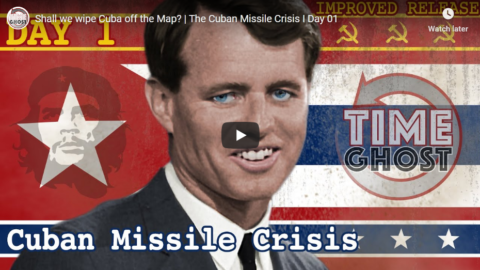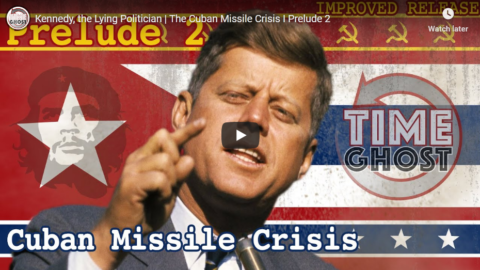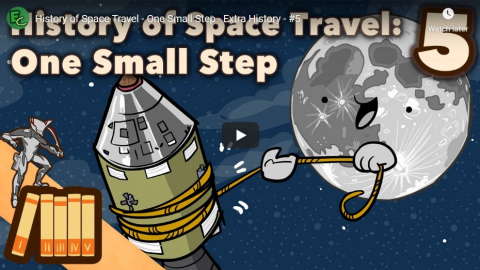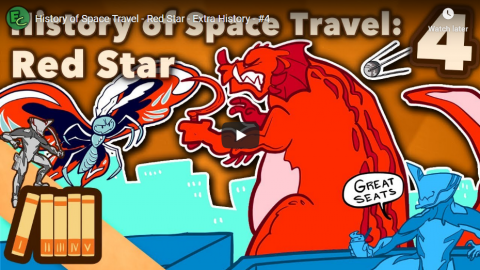TimeGhost History
Published 7 Jul 2020On 16 October 1962, the Cuban Missile Crisis begins. President Kennedy assembles his advisors in EXCOMM to find an adequate response to the threat posed by Soviet nuclear missiles on Cuba.
Join us on Patreon: https://www.patreon.com/TimeGhostHistory
Hosted by: Indy Neidell
Written by: Spartacus Olsson
Director: Astrid Deinhard
Producers: Astrid Deinhard and Spartacus Olsson
Executive Producers: Astrid Deinhard, Indy Neidell, Spartacus Olsson, Bodo Rittenauer
Creative Producer: Joram Appel
Post-Production Director: Wieke Kapteijns
Research by: Spartacus Olsson
Edited by: Daniel Weiss
Sound design: Marek KaminskiColorizations:
– Carlos Ortega Pereira (BlauColorizations) – https://www.instagram.com/blaucoloriz…Soundtracks from Epidemic Sound:
– “Cold Eyes” – Elliot Holmes
– “Zoot Suit” – Elliot Holmes
– “Juvenile Delinquent” – Elliot Holmes
– “Scope” – Got Happy
– “Nightclub Standoff” – Elliot Holmes
– “When They Fell” – Wendel SchererArchive by Screenocean/Reuters https://www.screenocean.com.
A TimeGhost chronological documentary produced by OnLion Entertainment GmbH.
July 8, 2020
Shall we wipe Cuba off the Map? | The Cuban Missile Crisis I Day 01
July 2, 2020
Kennedy, the Lying Politician | The Cuban Missile Crisis I Prelude 2
TimeGhost History
Published 1 Jul 2020The Cold War grows gets more and more tense as both the USSR and the US try to get the upper hand through the volume of nuclear weapons and strategic launching sites – including Cuba.
Join us on Patreon: https://www.patreon.com/TimeGhostHistory
Hosted by: Indy Neidell
Written by: Spartacus Olsson
Director: Astrid Deinhard
Producers: Astrid Deinhard and Spartacus Olsson
Executive Producers: Astrid Deinhard, Indy Neidell, Spartacus Olsson, Bodo Rittenauer
Creative Producer: Joram Appel
Post-Production Director: Wieke Kapteijns
Research by: Spartacus Olsson
Edited by: Daniel Weiss
Sound design: Marek KaminskiColorizations:
– Carlos Ortega Pereira (BlauColorizations) – https://www.instagram.com/blaucoloriz…
– Daniel WeissSources:
– New Georgia EncyclopediaSoundtracks from Epidemic Sound:
– “Cold Eyes” – Elliot Holmes
– “Juvenile Delinquent” – Elliot Holmes
– “Nightclub Standoff” – Elliot Holmes
– “Scope” – Got Happy
– “Zoot Suit” – Elliot Holmes
– “Car Chase in Virginia” – White Bones
– “When They Fell” – Wendel Scherer
– “Kissed by Thunder” – Elliot HolmesArchive by Screenocean/Reuters https://www.screenocean.com.
A TimeGhost chronological documentary produced by OnLion Entertainment GmbH.
January 21, 2020
Amity Shlaes’ Great Society: A New History
In City Journal, Edward Short reviews the latest American economic history book by Amity Shlaes:
In Great Society: A New History, Amity Shlaes revisits the welfare programs of the Kennedy, Johnson, and Nixon administrations to show not only how misguided they were but also what a warning they present to those who wish to resurrect and extend such programs. “The contest between capitalism and socialism is on again,” the author writes in her introduction. Despite the Trump administration’s thriving economy, or perhaps because of it, Democratic Party progressives are calling for new welfare programs even more radical than those advocated in the 1960s by the socialist architect of Lyndon Johnson’s War on Poverty, Michael Harrington. In the new schemes for wealth redistribution, student debt relief, socialized medicine, and universal guaranteed income that make up the Democrats’ political platform in 2020, Shlaes rightly sees a recycling of Great Society hobby horses — and she worries that a good portion of the electorate may be taken in by them. “Once again many Americans rate socialism as the generous philosophy,” she observes, and she has written her admirable, sobering study to make sure that readers realize that the “results of our socialism were not generous.”
Reviewing how ungenerous makes for salutary reading. After all, socialism of any stripe, whether in Russia, South America, Europe, or America, has always been an inherently deceitful enterprise. Shales captures the essence of this imposture when she describes one of its manifestations as “Prettifying a political grab by dressing it up as an economic rescue.” In totting up these receipts for deceit, Shlaes has done a genuine public service. […]
On display here are all of Shlaes’s strengths as an author: her clear and unpretentious prose, sound critical judgment, readiness to enter into the thinking of her subjects with sympathy (even when she regards it as mistaken), and, perhaps most impressively, understanding how history can help us fathom what might otherwise be obscure in our own more immediate history.
Accordingly, she describes the influence that Roosevelt’s New Deal had on Johnson, who saw it as a model for maintaining and consolidating his Democratic majorities, as well as focusing his Cabinet’s talents. “The men around Johnson,” Shlaes points out, including Robert McNamara, McGeorge Bundy, Richard Goodwin, and Sargent Shriver, “felt the weight of his faith on them, and strove hard. Vietnam would be sorted out. There would be a Great Society. Poverty would be cured. Blacks of the South would win full citizenship. The Great Society would succeed.” Yet the president’s men could not help asking “by what measures” it would succeed.
Moynihan’s answer to this question is one that still mesmerizes social-engineering elites. The Great Society would be achieved by social science. “Progress begins on social problems when it becomes possible to measure them,” Moynihan declared. Improved quantitative analysis would give the centralized power of planners a new credibility.
Whether Johnson himself ever truly believed in such claims is questionable. When aides asked the exuberant Texan what he thought of the risks of going forward with his wildly ambitious program, his reply epitomized the hubris at the heart of his Great Society: “Well, what the hell’s the presidency for?”
December 7, 2019
History of Space Travel – One Small Step – Extra History – #5
Extra Credits
Published 5 Dec 2019Start your Warframe journey now and prepare to face your personal nemesis, the Kuva Lich — an enemy that only grows stronger with every defeat. Take down this deadly foe, then get ready to take flight in Empyrean! Coming soon! http://bit.ly/EHWarframe
The United States was losing the space race. A number of unfortunate missteps and mistakes had hindered their progress. But the United States had also structured its space program entirely differently from the USSR. Instead of being helmed by the military, the National Aeronautics & Space Administration was created by Eisenhower with an emphasis on exploration and research. And in the end, the later but more advanced satellites will collect the data required a dream firmly placed in the American consciousness by JFK. A dream to place a man on the moon.
From the comments:
Extra Credits
19 hours ago
The plaque still gives me goosebumps in the best way possible. Hopefully one day we can live up to its promise of peace. Be good to one another. ❤️And thanks to Rebecca Ford (the voice of Lotus) for voicing space mom at the end of each of these episodes. They’ve been a blast to make and we hope that you all have enjoyed this trip to the stars.
November 29, 2019
History of Space Travel – Red Star – Extra History – #4
Extra Credits
Published 28 Nov 2019Start your Warframe journey now and prepare to face your personal nemesis, the Kuva Lich — an enemy that only grows stronger with every defeat. Take down this deadly foe, then get ready to take flight in Empyrean! Coming soon! http://bit.ly/EHWarframe
While rockets had been proven to be indispensable to the Second World War, the idea to send people up into orbit was still seen as fantasy. Space was important only as a method to further the range of missiles meant to land oceans away from their original launch point. But a man named Korolev will change all of that, with work so secretive, he will be referred to as Chief Designer for nearly his entire life. But we all know the name of his first project into space: Sputnik.
From the comments:
Extra Credits
1 day ago
We weren’t able to fit her into the episode, but the other famous first cosmonaut in space is Laika, the Soviet space dog. She was a stray who was taken in by the program to test the Sputnik 2 and some of its life support features (like a coolant fan). Unfortunately, Laika did not return from her mission alive but she’s still regarded highly in the history of space flight and has become a symbol for the space race and animal testing in general. Look her up!
I remember reading in Robert Heinlein’s Expanded Universe of the day on his tour of the Soviet Union in 1960 when he and his wife were told by a group of Red Army cadets of a Soviet rocket launch carrying a human into orbit for the first time. The story was officially denied and the capsule was said to be unmanned after all. Wikipedia says:
According to Gagarin’s biography, these rumours were likely started as a result of two Vostok missions equipped with dummies (Ivan Ivanovich) and human voice tape recordings (to test if the radio worked) that were made just prior to Gagarin’s flight.
In a U.S. press conference on February 23, 1962, colonel Barney Oldfield revealed that an uncrewed space capsule had indeed been orbiting the Earth since 1960, as it had become jammed into its booster rocket. According to the NASA NSSDC Master Catalog, Korabl Sputnik 1, designated at the time 1KP or Vostok 1P, did launch on May 15, 1960 (one year before Gagarin). It was a prototype of the later Zenit and Vostok launch vehicles. The onboard TDU (Braking Engine Unit) had ordered the retrorockets to fire to recover, but due to a malfunction of the attitude control system, the spacecraft was oriented upside-down, and the firing put the craft into a higher orbit. The re-entry capsule lacked a heat shield as there were no plans to recover it. Engineers had planned to use the vessel’s telemetry data to determine if the guidance system had functioned correctly, so recovery was unnecessary.
May 21, 2019
March 3, 2018
Cuban Missile Crisis – Black Saturday – Extra History – #3
Extra Credits
Published on 1 Mar 2018*Sponsored by DomiNations: https://smarturl.it/CubanMissile1
With simultaneous nuclear tests by both the US and Russia, and tense miscommunications among troops on the ground, in the air, and on the water, the doomsday clock ticked to 11:59 PM for one fateful day.
February 23, 2018
Cuban Missile Crisis – Eyeball to Eyeball – Extra History – #2
Extra Credits
Published on 22 Feb 2018Sponsored by DomiNations: https://smarturl.it/CubanMissile1
After President Kennedy’s television address, tensions are rising. Fidel Castro is getting annoyed at the US and Soviet Union alike, and everyone else has their own ideas on what retaliation looks like.
February 17, 2018
Cuban Missile Crisis – I: The Failed Checkmate – Extra History
Extra Credits
Published on 15 Feb 2018An eye for an eye, a missile for a missile — that’s how the saying goes, right? So thought the Soviet Union and the United States in the early fall of 1962, kicking off a 13-day staring contest that scared the world.
January 28, 2018
Day 13 Cuban Missile Crisis – The End to End All Things and Almost Everything
TimeGhost
Published on 21 Dec 2017On Sunday, 28 October, 1962 the Cuban Missile Crisis is supposed to end, but there are still two nuclear armed Soviet submarines in the waters around the island hunted by the US Navy. And what about Fidel Castro?
January 27, 2018
Day 12 Cuban Missile Crisis – Black Saturday, nuclear war on autopilot…
TimeGhost
Published on 7 Dec 2017On October 27, 1962 a deal to resolve the Cuban Missile Crisis is ever so close, but then almost everything that can go wrong, goes wrong. Political confusion between the leaders, lost and shot down airplanes, errant nuclear armed submarines and exhaustion takes its toll. For those immediately involved it will go down in memory as the Black Saturday.
January 26, 2018
Day 11 Cuban Missile Crisis – Will President Kennedy invade Cuba after all?
TimeGhost
Published on 30 Nov 2017On 26 October 1962, USSR Premier Nikita Khrushchev is preparing to offer the US an olive branch. Meanwhile US President John F Kennedy continue to plan an invasion of Cuba. While the politicians make new plans, their previous military plans take on a life of their own
January 25, 2018
Day 10 Cuban Missile Crisis – Showdown at the U.N. Corral
TimeGhost
Published on 27 Nov 2017On October 25, 1962 while the US Navy are looking for something to do in the Caribbean, both USSR Chairman Khrushchev and US President Kennedy are questioning the success of their actions. Meanwhile US Ambassador to the UN Adlai Stevenson is about to face off with USSR Ambassador to the UN, Valerian Zorin in a historic showdown at the United Nations headquarters in New York.
January 24, 2018
Day 9 Cuban Missile Crisis – Blockade starts and low altitude flybys over Cuba
TimeGhost
Published on 23 Nov 2017On October 24, 1962 the US led blockade on Cuba goes into effect, but it’s not the be the showdown that it looks like! In the same time the US Navy starts flying RF8 Crusader reconnaissance jets 400 feet over the missile sites on Cuba, to see what’s really going on. As the jets roar over the heads of the Cuban and Soviet soldiers, the crisis deepens.
January 23, 2018
Day 8 Cuban Missile Crisis – Kennedy and Khrushchev face reality
TimeGhost
Published on 20 Nov 2017On October 23, 1962 as the blockade on Cuba is being prepared, US President John F. Kennedy and USSR Chairman Nikita Khrushchev question their own actions realising that they might have gone a step too far. By now the dice have been rolled and it’s too late to stop the wheels from spinning. Both leaders try to justify their decisions to maintain their political power.








